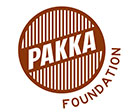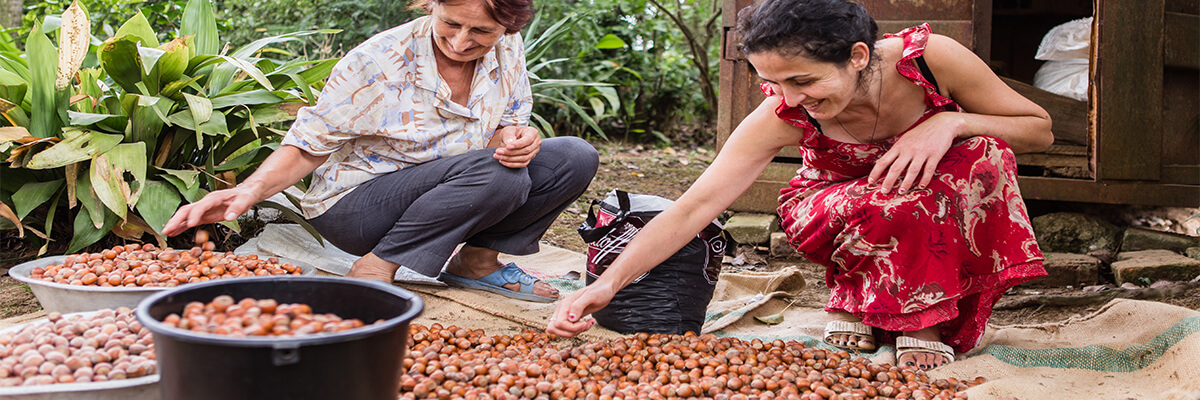Overview
- The hazelnut is the main source of income for more than 50,000 small farmers in the region.
- Intensive insect infestation from 2016 to 2018 has severely affected the quality, harvest and price of hazelnuts, prompting the government to spray systemic insecticides on a large scale, which pollute the environment.
- Together with local partners, the Pakka Foundation is working to improve the resilience of small farmers, especially women, through a broad-based project.
Our commitment
Promotion of local capacities
- Small farmers and cooperatives
- Support for the development of a local long-term agricultural advisory service to improve farming practices
- Support for basic business training for households and cooperatives
- Introduction of processes for successful certification (organic & fair trade)
- Support of sustainable pest control for networking national and international research institutes
Increase of local added value and economic feasibility
- Improving market access for Georgian hazelnuts
- Exhibitions, on-site visits to customers, communication via various media
- Through pyrolysis stoves, climate financing and more efficient nutrient management
Market orientation and long-term trade relations
- Introduction of guidelines and implementation plan for “Responsible Business Conduct”
- Improvement of reception conditions for small farmers
- Annual negotiations with the cooperatives on delivery conditions (quality, quantities, etc.)
Organizational development/advocacy
- Networking of the industry to promote the joint representation of interests
- Presentation of the strategic importance of local added value and certified sustainable production in public programmes and action plans
ddddddf
Partner and donors
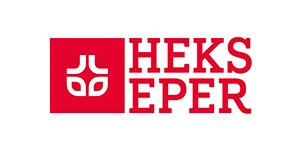 |
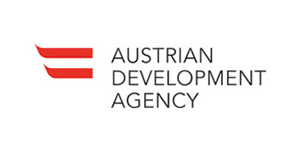 |
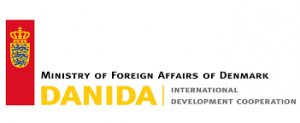 |
Goals & Values
- 1500 trained and certified farming families (at least 20% women, 30% young people < 35 years) and 20 cooperatives.
- The new market system around certified production will benefit farmers outside the project.
- Promotion of diversified cultivation and nutrition among small farmers.
- The project is expected to produce 2445 tons of certified hazelnuts per year.
- The project promotes the participation of women in project activities. One target cooperative – Edelweiss from the municipality of Tsalenjikha – is predominantly a women’s cooperative, and the management of the cooperative also consists only of women. However, as the maintenance of perennial cultures is traditionally considered mostly a male responsibility, other cooperatives are managed by men, and the average participation of women in these cooperatives is about 20% of all members. Despite this small number, the female members are very active in all cooperatives.
- Hardly any farmer has access to microcredit to increase his production. The aim of this project is to reconnect farmers with credit institutions to enable healthy growth.
- Create as much added value added as possible including roasting, chopping, chocolate coating
- To process the majority of hazelnuts into end products by roasting, chopping and paste production to achieve maximum added value in Georgia.
- Minimising food waste along the value chain by ensuring that harvesting and processing are fast, complete and clean.
- Ensure that the factory uses renewable energy, disposes of wastewater and waste appropriately and uses sustainable packaging
- Ensuring a positive ecological footprint for the entire value chain.
- Sell Co2 emission certificates through the production of biochar
- Promotion of biodiversity through biologically diversified agroforestry.
- Combating biodiversity loss through small-scale agriculture and providing safe islands from systemic insecticides.
Impressions
Background
Hazelnut production has a long tradition in Georgia because the agro-climatic conditions of the Black Sea region are ideal for it. The economic importance of the sector has grown continuously since the 1990s. Today, the marketing of hazelnuts is the main source of income for more than 50,000 small farmers, while around 107,000 households are employed in the sector. Despite the good agronomic conditions, the economic potential of
Hazelnuts in Georgia not yet exhausted. For example, productivity is rather low compared to other producing countries and the quality of the kernels can still be improved in some places. Both are key factors to improve marketing on the international and local market. Also, the resilience of households should be improved, as changes in production or marketing can have a strong impact on income due to their great importance for the local economy. This has been confirmed over the past five years: a spring frost in Turkey in 2014 has increased demand and thus prices in Georgia, while intensive insect infestation in 2016 and 2017 will have a major impact on the quality, harvest and prices of hazelnuts.
In cooperation with the local processor Anka Fairtrade Ltd. and the Georgian NGO for organic farming “Elkana”, the Pakka Foundation has been involved in building a sustainable organic & fairtrade value chain for hazelnuts since 2013. The project is made possible by the Pakka Foundation’s own resources and the financial support of HEKS/DANIDA and ADA.
By 2021 around 1600 farming families in the regions of Samegrelo-Zemo Svaneti, Guria and Imereti should be able to benefit from the promotion of a sustainable value chain. The table below gives an overview of the activities and areas of activity of the Pakka Foundation.
Further links:
https://www.researchgate.net/publication/226038600_Corylus
http://enpard.ge/en/wp-content/uploads/2015/05/Market-Assessment__Hazelnut__AYEG_ENG.pdf
https://www.ebrd.com/news/2018/ebrd-and-eu-foster-hazelnut-production-in-georgia.html
https://comtrade.un.org/data/
We are looking for supporters for our project. If you are interested, please click on the button and learn more.
